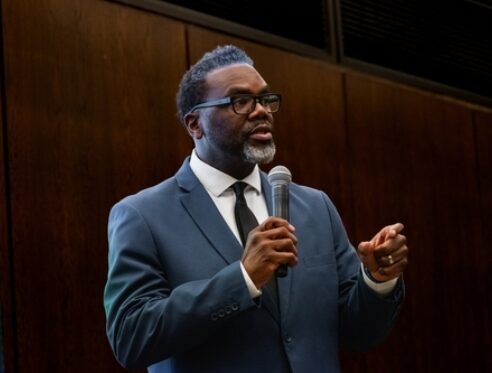The Chicago Board of Education is advancing a resolution at its February meeting to formally abolish police officers from all schools beginning next fall.
Background: For decades, CPS provided high schools with two police officers, known as school resource officers (SROs).
Facing pressure to remove all police from schools following protests in 2020, Mayor Lori Lightfoot decided to push the decision down to individual Local School Councils (LSCs) rather than issue a blanket removal.
- CPS worked with five organizations — Voices of Youth in Chicago Education, Mikva Challenge, Community Organizing and Family Issues, The Ark of St. Sabina, and BUILD Inc. — to develop holistic whole-school comprehensive safety strategies for schools to consider as an alternative to SROs.
In addition to a suite of supports, schools receive special funding for each SRO removed.
In the summers of 2020 and 2021, 24 schools voted to remove all officers, but in the last two years, only one school voted to remove both of its officers.
Currently, there are 55 SROs across 39 high school campuses – a 47% decrease in the number of SROs since 2020 – with 16 schools opting to have two SROs and 23 with one.
Why It Matters: The debate over SROs underscores the complex balance between ensuring school safety and fostering an educational environment that supports student learning and development.
It revives a central question about who gets to make decisions about school safety – local school communities or district leadership.
It also occurs against the backdrop of four students murdered last month shortly after leaving school. Although it is very unlikely any of these tragedies would have been prevented if SROs had been present, crime and safety concerns remain on the top of CPS parents’ minds as our latest Enrollment Solutions report illustrates.
Zoom Out: Mayor Brandon Johnson has changed his position on whether LSCs should hold decision-making power to keep SROs.
During his mayoral campaign, Johnson said unequivocally that police “have no place in schools.”
But as mayor in June 2023, Johnson said he supported the “democratic process” and would defer to LSCs to decide whether to keep SROs. A week later, the CPS Board approved a $10.3 million contract with the Chicago Police Department (CPD).
Shortly after the new year, news broke that Johnson’s school board would no longer support police presence in schools. CPS began preparing principals for the possible removal of all SROs by next fall.
Now Johnson says he supports severing the district’s contract with CPD and has given his board the green light to do so.
What They’re Saying: Following a December 2023 meeting with district officials, principals in attendance felt “blindsided” when told “the board had made a unilateral decision” to remove SROs without their input.
Alds. Chico (10th) and Cruz (30th) spoke at last month’s CPS board meeting advocating for LSCs to maintain their decision-making authority over SROs. Ald. Sposato (38th) called the plan to remove SROs from schools “a terrible idea.”
Both the Sun-Times and Tribune editorial boards called on the CPS Board to continue deferring to LSCs on the SRO question.
A proposal in Springfield would let LSCs make the final decision on SROs in schools, although it is unclear how the legislation would apply if CPS ends its contract with CPD.
Get Smart: Most research on SRO programs — whether police actually make schools safer, or whether their presence harms students — shows that schools with police tend to have higher arrest and suspension rates while providing no clear verdict on whether police reduce in-school crime or major conflict.
Several studies indicate SROs may contribute to a decrease in school crime rates, while other research finds they have no significant effect at all.
One Texas study linked more police to lower high school graduation rates.
Students’ perceptions of whether police officers make schools safer vary significantly by race, with Black students consistently sharing they felt less safe in schools with a police officer than their non-Black peers.
Even some conservative outlets, traditionally more supportive of police in schools, have said government should be wary of SRO programs “[g]iven the paucity of good research and the mixed findings of what does exist.”
Locally, a 2020 Sun-Times analysis found that students who attended a high school with SROs were four times more likely to have the police called on them than kids at high schools that did not.
But multiple Chicago school principals have spoken glowingly about their school’s SROs, saying they have had a “positive impact” on the school and have worked hard to build relationships with students.
Reality Check: If SROs are abolished, will schools who currently participate in the SRO program have enough time, resources, and support to design and implement new whole school safety plans with sufficient involvement from their school community?
- Timing: The 2024-25 school year starts in six months, but because most school-based staff do not work over the summer, schools that participate in the SRO program will have to design and finalize alternative school safety plans before the end of the school year.
School staff would then have just 1-2 weeks to prepare for implementation before the school year begins in August.
LSC elections this spring also complicate their role in the development and execution of school safety plans given that new LSC members won’t be seated until July 2024.
- Resources & Support: How does CPS’s projected budget deficit of $391 million factor into the district’s ability to provide financial resources to schools losing their SROs?
And does CPS truly have the capacity to support 39 schools — nearly a third of all high schools — in redesigning and implementing revamped school safety plans by next fall?
K1C’s Take: While the effectiveness of SROs in enhancing school safety appears mixed, the presence of police officers in schools has led to the criminalization of minor offenses and contributed to feelings of fear and mistrust that can negatively affect students' feelings of safety and their overall educational experience.
That said, parents, students, and educators on LSCs, who have been the respected authorities on whether their school should retain SROs based on the unique needs and context of their school communities, appear to be losing their decision-making power.
If the CPS Board adopts the resolution and votes to eliminate the SRO program, it would mark another instance of the Board imposing its views on the school system instead of making decisions after first engaging school communities.
This pattern of top-down decision-making also runs counter to Mayor Johnson’s stated belief that “democracy is the best form of governance for our public school system.”
- And if the response to whether schools are fully prepared is anything less than a definitive yes, and if the Board values the complete removal of SROs more than it does allowing LSCs to retain their decision-making authority, then the district should consider a more gradual phase-out of SROs by the end of the 2024-25 school year.
This approach would give school communities, including new LSC members, more time to develop and implement new safety strategies for their schools.
What’s Next: The Board will vote on the SRO resolution at its February 22nd meeting.
- In addition to the overarching question of whether schools will have enough time and support to create new school safety plans, we hope the Board’s discussion on the resolution will address two additional key questions:
Why should LSCs no longer be entrusted with the decision-making authority over SRO programs?
Why does the removal of SROs need to happen by next school year?

If the CPS Board adopts the resolution and votes to eliminate the SRO program, it would mark another instance of the Board imposing its views on the school system instead of making decisions after first engaging school communities.



